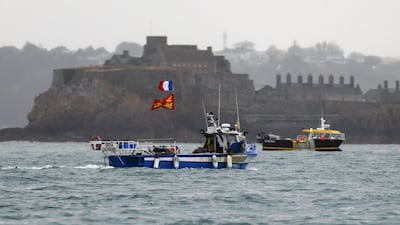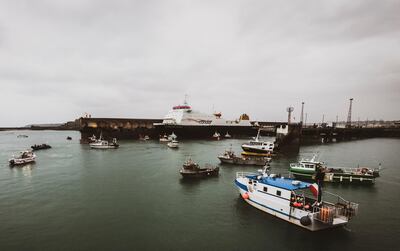Later this summer, Covid-19 permitting, I hope to go to my home in the British Channel Island of Jersey for the first time in a couple of years. I will visit, as usual, the island’s north-east corner, from where I can see the coast of Normandy, in France, less than 20 kilometres away.
Between Jersey and Normandy, but closer to Jersey, is a little archipelago, Les Ecrehous, long claimed by France, but over which Jersey’s sovereignty was declared by the International Court of Justice in 1953. French boats still land there, ignoring immigration rules, despite protests from Jersey. These are peaceful waters, but full of history.
Now, suddenly, they have become the focus of an explosive diplomatic row between Britain and France.
This area between Jersey, Normandy and Brittany, to the south, is called the Bay of Granville. For hundreds of years, history has linked Jersey with these neighbouring parts of France. As part of the Duchy of Normandy, Jersey took part in the invasion of England by William the Conqueror in 1066. Not until 1204 did it become self-governing, as a dependency of the British Crown. The last, unsuccessful, French invasion of Jersey in 1781 set off from the Normandy town of Granville. During the time of Napoleon, Jersey was an important centre for the French royalist resistance. Jersey, like France, was occupied by Germany during the Second World War, although it was not until 76 years ago, on May 9, 1945, that Jersey was liberated.
Since 1839, a series of agreements involving Jersey, Normandy and Brittany, most recently the Bay of Granville Agreement, signed in 2000, have allowed access by French boats to Jersey waters. Following Britain’s withdrawal from the EU, that agreement ended, though Jersey was never part of the EU and didn’t take part in the 2016 referendum in the UK. Now, access for fishermen is governed by the new UK-EU Trade and Economic Co-operation Agreement, which gives Jersey effective control over its own waters.
Jersey’s new regulatory regime issues the licences allowing French vessels to fish in Jersey’s waters. Disagreements over those have led to the remarkable events of this week. Both the UK and France have sent naval vessels, Norman and Breton fishermen staged a short-lived protest blocking Jersey’s port of St Helier and the French Minister of the Sea, herself the daughter of a fisherman from the Breton port of St Malo, has threatened the island with the cutting off of its electricity supplies from France.
It’s not quite a war at sea, but intemperate and jingoistic headlines, particularly in the British media, have certainly been presenting it as more than a war of words.
One of the most effective slogans of British Prime Minister Boris Johnson in campaigning for Brexit was “taking back control” of British waters. Arguments around implementation of the new UK-EU Trade and Economic Co-operation Agreement seemed inevitable. Jersey accepted, though, that Norman and Breton boats could continue fishing under the new licensing regime.
More French boats fish in Jersey waters than boats from Jersey, and they’re bigger, too. An effective management regime to conserve stocks is essential. In the long run, this is likely to require a downsizing of fishing fleets.
For the moment, though, much of the catch in Jersey waters by French and Jersey boats is exported to France. That trade has now been disrupted. Last night, one Jersey fisherman offered to give away 400 kg of cuttlefish free to fellow islanders, because he had been blocked from landing them at the port he normally uses in Normandy.
Miscommunication has been at the heart of this dispute. French fishermen can apply for licences to continue to fish in Jersey waters. The formal procedure, though, has been that communications must follow a tortuous route, from Normandy to Paris, then to the EU Commission in Brussels, then to London, then to Jersey. Responses go back the other way. It’s been a recipe for confusion and delay. A forum for direct communications between Jersey and the French fishermen has now been worked out, thanks to efforts by Jersey’s Minister for External Relations, Ian Gorst. That, at least, should help to clarify matters and to calm tempers.
Bringing the confrontation to an end, however, is not going to be so easy. The most difficult task will be that of taking the politics out of what is essentially a fishing dispute.
With London and Paris still squaring up to each other in the aftermath of Brexit, regardless of the interests of those most intimately involved, there’s little sign that they are yet ready to work towards a long-term resolution. Meanwhile, in Jersey, with tempers high and with islanders stunned at the threat to cut off their electricity, there’s a sense of amazement that this dispute, important though it is to local livelihoods, has become a focus of global attention.
Peter Hellyer, a Jerseyman, is a UAE cultural historian and columnist for The National



